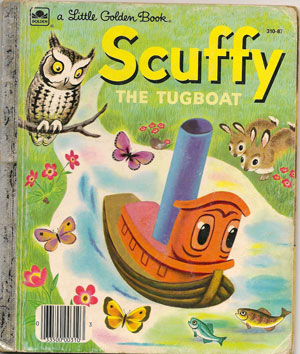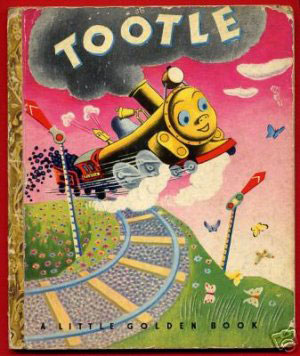The Moral Of The Story
/THREE TIMES BEFORE, I have written about my favorite movies in posts I call Pops' Flick Picks: The Graduate, Finding Forrester, and Pleasantville. Here's my fourth: Mr. Holland's Opus.
Mr. Holland composed an opus, but not the one he believed he was destined to write. That happens, you know.
Recently I was giving a talk to a group of business managers. I was trying to make a point using a book from The Little Golden Book series called "Scuffy The Tugboat." This little book was read to me many many times as a child. Still, to this day, I read that book and I am still not certain what the moral of the story is. I know it has a moral; children's books just do, but I can't figure it out. Or, maybe I really have figured it out and just don't want to accept its thesis.
If you're not familiar with the story it opens with Scuffy sitting on a shelf in a toy store. He is obsessed with the sense that he was made for bigger and grander things than sitting in a toy shop. So the shop owner takes the little boat home to his son who quickly sets Scuffy to sail in the bathtub. But this too is unsatisfying and unworthy of the calling Scuffy believes is his.
The little boy takes Scuffy to a stream. Scuffy quickly makes his way to wider and deeper waters and ultimately finds himself overwhelmed with rough seas and the heavy traffic of big ships and other things that go bump in the night.
[Spoiler Alert] Fortunately for Scuffy, The man and his little boy find him on the brink of destruction and rescue him. The story ends with Scuffy happily floating in the safe confines of the little boy's bathtub, content with the realization that this is his destiny after all.
So what is the moral of this story? I really want to know. Don't tell me it is: to be content with your circumstances, to quash any temptation to explore beyond the obvious boundaries. I find that very unsatisfying.
Scuffy The Tugboat was written by Gertrude Crampton, who, not surprisingly also wrote Tootle The Train, the painful story of a little train that learned the hard way that you should always stay on the tracks no matter what.
But maybe Mr. Holland's Opus is a Scuffy story. If it is, then maybe I do get it and can accept it as a valid and satisfying plot line for my life. Like, maybe I wasn't built to be in the big waters, but maybe I can have a significant and worthwhile life anyway.
Here's a line from the movie that will help you see why I think it may be a Scuffy story. This is from a character called Gertrude Lang, one of Mr. Holland's students.
I have a feeling that Mr. Holland considers a great part of his own life misspent. Rumor has it he was always working on this symphony of his. And this was going to make him famous, rich, probably both. But Mr. Holland isn't rich and he isn't famous, at least not outside of our little town.
I hope I haven't already given too much away in case you haven't already seen Mr. Holland's Opus.
Maybe what Scuffy and Tootle and Mr. Holland teach us is that we can learn from others and our own experiences. We can also contemplate our future.
"Neuroscience has long recognized that emulation of the future is one of the main businesses intelligent brains invest in. By learning the rules of the world and simulating outcomes in the service of decision making, brains can play out events without the risk and expense of attempting them physically. As the philosopher Karl Popper wrote, simulation of the future allows 'our hypotheses to die in our stead.'" --David Eagleman, a neuroscientist at the Baylor College of Medicine, writing in The New York Times. August 2012.
In other words, we humans can play what-if. Kids do it all the time when they are playing make-believe. What if this... What if that... They are imagining possibilities, creating story lines. If only Scuffy could have contemplated the "what-if" of being a little toy boat in the deep, storm-tossed seas among the big ships, he could have saved himself the horror of reality. Maybe if he had, he would have known: life in the bathtub isn't so bad--metaphorically.
But, with apologies to Gertrude Crampton, I still contend that occasionally we need leave the tracks, color outside the lines, do something that makes our palms sweaty. To use a Mr. Holland analogy, Ms. Crampton would be happy to just play the notes on the page, when really, I believe God intended for us to be musical: so dance, or sing, or play.
Playing music is supposed to be fun. It's about heart, it's about feelings, moving people, and something beautiful, and it's not about notes on a page. I can teach you notes on a page, I can't teach you that other stuff. -- Mr. Holland




